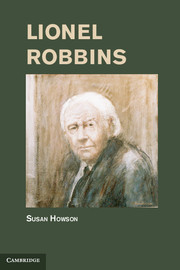Book contents
- Frontmatter
- Contents
- Illustrations
- Abbreviations
- Introduction
- One Father and Son
- Two The Great War
- Three Postwar
- Four The London School of Economics
- Five Iris Gardiner
- Six New College Oxford
- Seven The Young Professor
- Eight Fritz and Lionel
- Nine The School in the Mid-1930s
- Ten The Approach of War
- Eleven The Economics of War
- Twelve Director of the Economic Section
- Thirteen Anglo-American Conversations
- Fourteen The Law Mission and the Steering Committee
- Fifteen 1 9 4 4
- Sixteen The Last Months of the War
- Seventeen The Postwar Settlement
- Eighteen Return to the School
- Nineteen The End of the Transition
- Twenty LSE in the Early 1950s
- Twenty-One Chairman of the National Gallery
- Twenty-two Lord Robbins
- Twenty-three The Robbins Report
- Twenty-four The Sixties
- Twenty-five The Arts
- Twenty-six The Troubles at LSE
- Twenty-seven Retirement
- Conclusion
- Bibliography
- Index
Sixteen - The Last Months of the War
Published online by Cambridge University Press: 07 October 2011
- Frontmatter
- Contents
- Illustrations
- Abbreviations
- Introduction
- One Father and Son
- Two The Great War
- Three Postwar
- Four The London School of Economics
- Five Iris Gardiner
- Six New College Oxford
- Seven The Young Professor
- Eight Fritz and Lionel
- Nine The School in the Mid-1930s
- Ten The Approach of War
- Eleven The Economics of War
- Twelve Director of the Economic Section
- Thirteen Anglo-American Conversations
- Fourteen The Law Mission and the Steering Committee
- Fifteen 1 9 4 4
- Sixteen The Last Months of the War
- Seventeen The Postwar Settlement
- Eighteen Return to the School
- Nineteen The End of the Transition
- Twenty LSE in the Early 1950s
- Twenty-One Chairman of the National Gallery
- Twenty-two Lord Robbins
- Twenty-three The Robbins Report
- Twenty-four The Sixties
- Twenty-five The Arts
- Twenty-six The Troubles at LSE
- Twenty-seven Retirement
- Conclusion
- Bibliography
- Index
Summary
The postwar commercial policy talks finally resumed on 7 December 1944. It was a small gathering: Liesching, Eady, Fergusson, Robbins and Shackle on the UK side; Hawkins, Penrose and Loyd Steere of the US Embassy on the American. Meade, sorry not to be present, heard it was an ‘almost dramatic’ occasion (COD, 14). Liesching opened by explaining the UK political difficulties, especially over agriculture, in accepting the results of the Washington conversations, but instead of responding with searching questions Hawkins told the group that senior officials in the US Administration had now prepared their own set of proposals for a multilateral convention based on the Washington proposals and offered to outline them (AS(US)(44)1st meeting). Meade and Robbins cannot have been completely surprised. A few days earlier Penrose had asked Meade if he and Hawkins could come round to see him. Meade told Robbins on 27 November (T230/173) that Hawkins had ‘made it clear that, as he put it, the Americans had been persuaded by us that the multilateral approach to the problem of tariff reductions was the right one. What is much more significant, he went on to make it quite apparent that the Americans intend to offer a treatment of tariffs on multilateral lines which would involve a really very extensive and substantial reduction of the American tariff’ and had asked if this would help the British. Meade had replied that ‘it would, of course, be a very material factor’. The proposals Hawkins outlined on 7 and 11 December included the reduction of tariffs by 50 per cent, subject to a floor of 10 per cent, the narrowing of preferential margins by applying the tariff cuts to the non-preferential rates and the prohibition of quantitative restrictions after the transitional period except in certain special cases. Exchange controls on current transactions were to go, after a transitional period during which there should be no discrimination except on grounds of serious balance-of-payments difficulties. Export subsidies were not permitted, domestic subsidies were not explicitly ruled out, but new or increased subsidies would have to be reported to the international trade organization with a justification (AS(US)(44)1st and 2nd meetings).
- Type
- Chapter
- Information
- Lionel Robbins , pp. 553 - 586Publisher: Cambridge University PressPrint publication year: 2011

